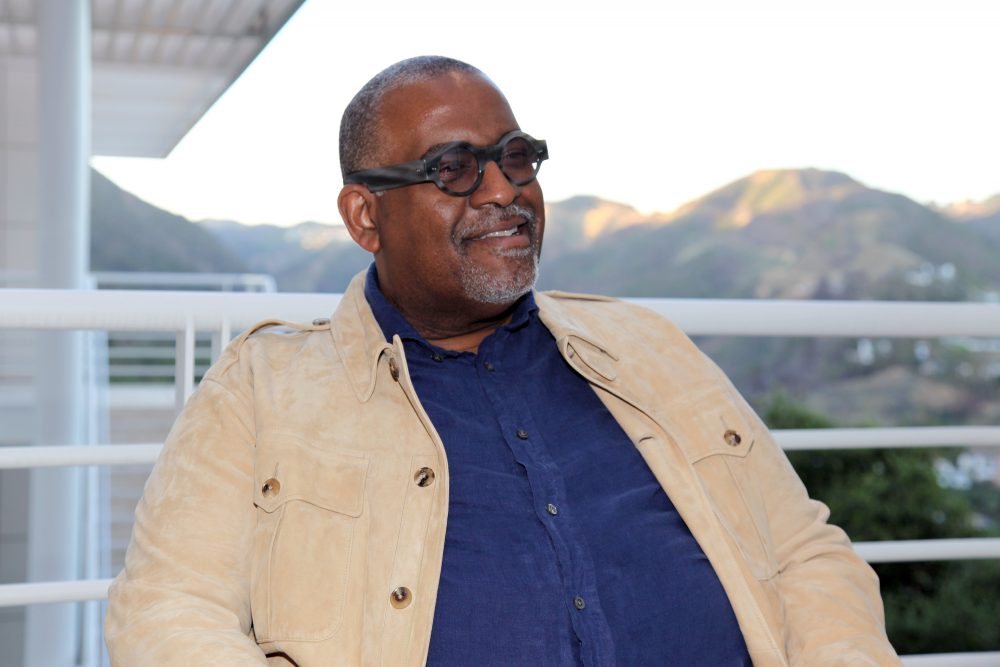
Photo by Aaron Salcido.
Todd Boyd is a race and pop culture scholar at the University of Southern California School of Cinematic Arts. He appeared in the Academy Award-winning documentary Twenty Feet From Stardom, and is the author of several books, including Young, Black, Rich, and Famous: The Rise of the NBA, the Hip Hop Invasion, and the Transformation of American Culture. Before taking part in a Zócalo/Getty panel discussion titled “Can We Appreciate the Great Art of Bad People?” at The Getty Center, he spoke in the green room about New York’s ’50s jazz scene, Howard Cosell’s influence on him, and his boyhood sports heroes.
Did you have a sports idol when you were growing up?
It would be hard to reduce it to one.
Give me a couple.
I was sort of coming of age in the ’70s, and so the first sports memory I have is seeing Muhammad Ali and Joe Frazier right before their first fight in Madison Square Garden. So Ali for sure. And when Ali passed away in 2016, CBS invited me to be sort of the on-air commentator during that day’s events, which was really sort of a nice arc considering that Ali had been so influential in my childhood. A couple years later I saw Hank Aaron break Babe Ruth’s home run record, in ’74, and I was a bit older and maybe more conscious. And so those two people, Ali and Hank Aaron, were at the forefront of my developing interest in sports, and they were heroic figures for me at that time.
If you could time-travel, where and when would you go?
I often think I was born probably 20 years too late. I would’ve liked to have been in New York in the late ’50s, during what was the height of jazz, at its creative peak. I was born a few years later, but to have been old enough to have been on that scene, the writers—Norman Mailer is somebody who has played a big role in my career—and Miles Davis, Charlie Mingus, Thelonious Monk. To be able to have watched Sugar Ray Robinson box. Those would have been, I think, enjoyable times to participate in, as an adult old enough to access all of that.
Was there a person who really influenced you or shaped your career?
Growing up, I spent a lot of time watching sports on television. And I think the first person I really connected with was [sports announcer and commentator] Howard Cosell. Because he was talking about sports, and I was really interested in sports, but he had a vocabulary that was not what you would normally find in a sports broadcast. And there was an authority when he spoke. And later on I found out he taught a class at Yale University called “Sports and Society.” So Cosell was influential.
Anyone else?
I guess later on in my life I was closer to figuring out what I would do, and I saw Dr. Harry Edwards from Berkeley, who of course organized the protest at the ’68 Olympics. And he was a doctor; I wanted a Ph.D., I didn’t know what I wanted to get it in, and I really didn’t know how to sort of frame it. And, it must’ve been in ’87, one of the executives for the Dodgers, Al Campanis, made these really unfortunate racist remarks about African Americans not having the “necessities” to be managers in baseball. And subsequently in the discussion that came about, I continued to see Harry Edwards, and think like, “Wow, this guy’s a doctor and is talking about sports.” And I knew I wanted to talk about a lot of things, not just sports, but it was a nice way to imagine how I might do my thing.
Besides watching sports, what do you do to unwind?
Well, when I watch sports I don’t unwind, because that’s work! You know, I don’t know that I ever really unwind—which is part of my nature. I’m fortunate in that I figured out a way to make a living by paying attention to things I enjoy anyway. So listening to music, or looking at art, or paying attention to politics, watching movies, these are all things that I get paid to talk about. It’s work, but it’s also enjoyable. I remember listening to a documentary about Charles and Ray Eames, and they talk about wanting to create a “seamless life.” So I have sort of made that one of my objectives. I don’t know if I’ve achieved it. But when you can work on things that you would be paying attention to anyway, that seems like a win.



